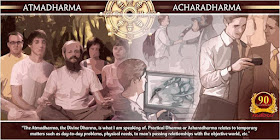Essence of Chapter 2
Swami says,
"Dharma expresses itself in a variety of forms. Sometimes, it is known by the people who codified it, like
Manu-dharma, sometimes by the group that followed it, like caste-dharma, sometimes by the stage of life to
which it is applied, like householder-dharma, and so forth. But these are subsidiary practical details and not the
fundamental norm. The Atma-dharma, the divine dharma, is what I am speaking of.
Practical dharma, or rules of good behaviour (achara-dharma), relates to temporary matters and problems
and physical needs, to one’s passing relationships with the objective world. The very instrument of those rules, the
human body, is itself not permanent, so how then can these dharma be eternal? How can their nature be described
as true?
The Eternal cannot be expressed by the evanescent; truth cannot reveal itself in untruth; light cannot be
procured from darkness. The Eternal can emerge only from the Eternal; truth can emanate only from truth. Therefore, the objective codes of dharma relating to worldly activities and daily life, though important in their own
sphere, have to be followed with the full knowledge and consciousness of the inner basic Atma-dharma. Then
only can the internal and external urges cooperate and yield the bliss of harmonious progress.
If, in your daily avocations, you translate the real values of eternal dharma into love-filled acts, then your
duty to the inner reality, the Atma-dharma, is also fulfilled. Always build your living on the Atmic base; then, your
progress is assured."
Prof. Venkatraman explains the above as under:-

